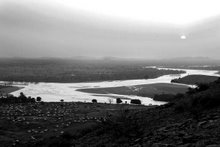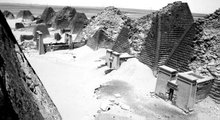 Many organizations are working in water and sanitation activities in the IDP (Internally Displaced People) camps of Darfur. The list of projects is varied: drilling boreholes and fitting hand pumps, digging wells, installing huge elevated steel water tanks, laying a system of reticulated water distribution points, building latrines…
Many organizations are working in water and sanitation activities in the IDP (Internally Displaced People) camps of Darfur. The list of projects is varied: drilling boreholes and fitting hand pumps, digging wells, installing huge elevated steel water tanks, laying a system of reticulated water distribution points, building latrines… Doing such a project is relatively uncomplicated. Funding is easy to come by, as the justification to bring water into a "sere, desolate environment" is apparent to most donours.
I visited an IDP camp a few weeks ago to set up a new project and get a feel for the ongoing humanitarian work there. It was one of the largest camps of Darfur, with a population of almost 100,000 IDPs, and it took us most of the day to tour the place by car. As we explored later on foot it was impossible not to notice the rivers of water that were streaming through many roads, turning them into mud and causing a bottleneck of pedestrians on the remaining piece of dry walkway. We followed one stream for three blocks, approximately 200 meters, until we found the source: smiling children bathing under a running tap, playing in the puddles, and wasting most of the water as it missed the UNICEF jug entirely and fell onto the ground.
The SPHERE standard for minimum water requirements is 15 liters a day per person, or approximately one and a half metal buckets. However, one water engineer that worked at this same camp in 2005 estimated that each person the camp used much more than that, and that 15-20% of it was wasted as it leaked or was carelessly left to stream down roads.
 One of my friends, a camp manager, told me that she assumed “[the camp residents] are used to conserving water and are averse to any type of waste.” She said that because many IDPs fled an area where water was scarce. Children walked for hours every day to fetch water from a safe source, or the village drank from nearby but shallow, contaminated wells that were often shared with herds of cows and donkeys.
One of my friends, a camp manager, told me that she assumed “[the camp residents] are used to conserving water and are averse to any type of waste.” She said that because many IDPs fled an area where water was scarce. Children walked for hours every day to fetch water from a safe source, or the village drank from nearby but shallow, contaminated wells that were often shared with herds of cows and donkeys.It is off course a good thing that IDPs have access to potable water. But we should not stick to a preconception that resource management will happen by itself just because the IDPs are from a desert and therefore used to water management.
What are the consequences of this system of water management for the IDPs? For one, it might mean that they will not return to their homes until they are offered this water in their villages (as has happened in Northern Uganda). Inside the camps there are health services, unlimited amounts of purified water only a short walk away, free food from WFP, and soon there will be schools for their children – none of which they had before. They stay in the camps because it is still too dangerous for them to return – but they will also stay because what they are offered there is too good to leave.




